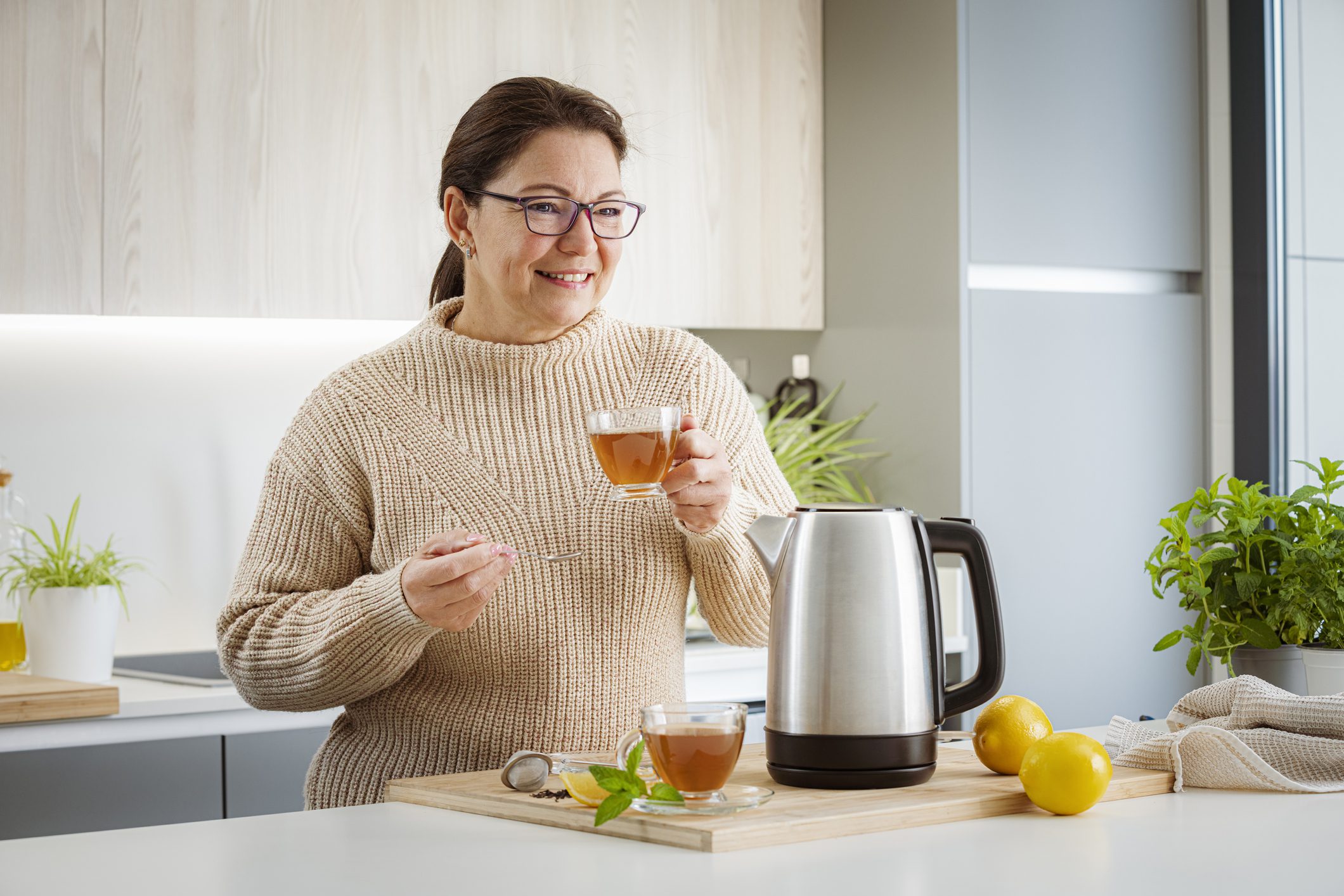It starts with a slight scratch in the back of your throat. You feel small aches and pains that you chalk up to getting older. Then, maybe your forehead starts to feel a little warm, or you notice a sudden cough. Not now, you think, I’ve got work deadlines and that dinner party Friday night that I’ve been looking forward to for weeks!
Nobody chooses to get sick, but unfortunately, it happens to all of us. Most people cope by calling in to work, binge-watching Netflix, and devouring carb-heavy junk foods.
I’m all about rest and recovery, which may or may not involve watching your favorite TV shows. I take a hard stance, however, against eating potato chips, ice cream, and all sorts of other guilty pleasures when you’re vegged out on the couch and not feeling well.
Fortunately, there’s a better way to eat when you’re sick – and you can even keep your go-to comfort foods!
Best Foods to Eat When You’re Sick
What to eat when you have a cold or flu depends partly on how you’re feeling. If you can, eat by the plate every four to six hours.
Leafy greens and cruciferous veggies are immune-boosting rock stars, healthy fats keep your immune cells humming, and protein provides the amino acids your body needs to fight infection. Research shows that not getting enough protein, on the other hand, can impair immune function and increase your risk of infection.1
If the idea of eating an elaborate meal doesn’t appeal to you, focus on loaded smoothies. Tossing ingredients like organic berries, extra-virgin coconut milk, and leafy greens, into your smoothie can provide an energy boost while providing the nutrients your body needs to heal.
My Loaded Smoothie Cookbook provides over 60 fast, fabulous recipes that take minutes to make but keep you full for hours. Claim yours for free here.
Other favorite foods to heal your body that are gentle on your system include bone broth (sip on this Beef Bone Broth throughout the day!) and green tea. Stay well-hydrated with plenty of clean filtered water, too.
If you’re really feeling blah and craving comfort food, skip the empty-nutrient chips, crackers, and other junk food, which will only make your illness worse. Instead, focus on these recipes.
- Paleo Egg Roll Bowl is quick, satisfying, and loaded with immune-supporting ingredients, like ginger, garlic, and cabbage.
- Paleo Spaghetti Squash with Capers, Onions, and Bell Peppers includes vitamin C-rich red bell peppers for a satisfying, healthier pasta alternative.
- Coconut Lemongrass Soup is smooth and creamy, with the immune-boosting power of coconut, mushrooms, and ginger.
- Chai Green Tea Latte with Whipped Coconut Cream combines two immune-boosting powerhouses (coconut and green tea) in a warm, satisfying drink.
- Crockpot Chicken & Cauliflower Rice Stew combines protein-packed chicken with nourishing cauliflower rice. Consider it an upgraded version of chicken noodle soup!
- Creamy Potato Mushroom Soup is another hearty favorite reinvented with nutrient-packed ingredients including chicken bone broth.
- Minestrone Soup provides immune-boosting garlic and onions, while basil and oregano kick up the flavor.
You’ll find many more upgraded comfort foods on my recipes page.
When you’re sick, self-care starts with what you eat… but it doesn’t end there! Read on to learn how rest, managing stress, and the right nutrients can all support your body’s healing abilities when you have a cold or flu.
Best Thing to Do When You’re Sick
If you’re feeling under the weather, the best thing you can do is rest. Pushing through when you’re feeling achy and fatigued isn’t the answer!
Research shows that getting great sleep when you have a cold or flu boosts your immune system to reduce infection risk, improve infection outcome, and even improve vaccination response.2
I want you to get eight to nine hours of solid, uninterrupted sleep every night. Quality and quantity are especially important when you’re sick. If you’re feeling drowsy during the day, turn off the TV and get some shut-eye. Naps are perfectly OK when you’re not feeling well (or any time if you can fit them into your schedule without disrupting your nighttime sleep).
Great immune-boosting sleep (and so much more) doesn’t just happen. You need to prepare for it. My Best Rest Sleep Cheat Sheet gives you my top tips to get consistently stellar sleep… every single night. Get yours FREE here.
Best Thing Not to Do When You’re Sick
It’s no coincidence that you get sick more often when you’re burning the midnight oil at work or dealing with a difficult family situation. Studies show that chronic stress can suppress or dysregulate your immune response.3 As a result, your body can’t fight viruses, and infections are more likely to linger longer.
If you feel sickness coming on, don’t stress out! Stress will make your cold or flu worse. Learn to say no, ask for help, and request more time for assignments if you need it. Life will go on… and stress will only make your cold or flu worse.
You can’t make stress disappear, but you can learn to better manage it. I’ll show you how in this podcast episode.
Take Ten Stress Support is a uniquely formulated product that provides gamma-aminobutyric acid (GABA), a key neurotransmitter for a normal, calm stress response. We’ve also added other calming nutrients, like glycine, niacinamide, pantothenic acid, and vitamin B6.* You can only order Take Ten Stress Support here.
Best Supplements to Take When You’re Sick
A few well-chosen supplements can support your body’s immune abilities. If you feel a cold or flu coming on, you’ll especially want to focus on a few critical nutrients.
Research shows that vitamin C supplementation (1-2 grams a day) can significantly shorten the duration of common colds, as well as the severity of cold symptoms.4 Likewise, vitamin D can support the body's immune response. Deficiencies in this critical vitamin may increase your susceptibility to infection.5
My favorite, science-supported supplements to fight infections and protect my immune system include the following:
- Sparkling C Powder combines a hearty dose of vitamin C with three bioflavonoids (quercetin, hesperidin, and rutin) along with calcium, magnesium, and potassium for a serious immune boost.*
- Vitamin D Plus combines therapeutic amounts of vitamin D with vitamin K, which work together as a nutrient team, along with the compound geranylgeraniol (GG) to enhance these health benefits.*
- Glutamine Powder contains therapeutic amounts of L-glutamine in an easy-to-mix powder. L-glutamine is a multitasking amino acid that boosts your master antioxidant glutathione, supports muscle recovery, heals the gut, and more.*
- Sleep Candy™ provides melatonin and other calming nutrients to help you fall asleep and stay asleep without that morning-after groggy feeling.*
Read about my 7 favorite supplements to support a healthy immune system in this blog.
Final Thoughts
When you’re sick, you likely crave comfort: familiar TV shows, your cozy blanket, and satisfying foods that make you feel good. Many of our childhood sick-day foods, however, came packed with sugar and problem ingredients, like gluten and dairy. With the recipes above, you can see how almost any favorite food or beverage can be upgraded!
Prevention is the best medicine. I find that when I take my supplements, get great sleep, manage my stress levels, exercise consistently, and eat by the plate, I’m far more likely to keep a cold or flu at bay. (Learn everything I do to keep my immune system strong in this article.)
But life happens, and even the best of us occasionally gets sick. When you make smart food choices along with the other strategies here, you’ll be back on your feet in less time… and possibly even take one of your sick days to do something fun (I won’t tell)!
The views in this blog by JJ Virgin should never be used as a substitute for professional medical advice. Please work with a healthcare practitioner concerning any medical problem or concern. The information here is not intended to diagnose, treat, or prevent any disease or condition. Statements contained here have not been evaluated by the Food and Drug Administration.
*These statements have not been evaluated by the Food and Drug Administration. This product is not intended to diagnose, treat, cure, or prevent any disease.
References:
- Li P, Yin YL, Li D, Kim SW, Wu G. Amino acids and immune function. Br J Nutr. 2007.
- Besedovsky L, Lange T, Haack M. The Sleep-Immune Crosstalk in Health and Disease. Physiol Rev. 2019 Jul 1;99(3):1325-1380. doi: 10.1152/physrev.00010.2018. PMID: 30920354; PMCID: PMC6689741.
- Dhabhar FS. Effects of stress on immune function: the good, the bad, and the beautiful. Immunol Res. 2014 May;58(2-3):193-210. doi: 10.1007/s12026-014-8517-0. PMID: 24798553.
- Bucher A, White N. Vitamin C in the Prevention and Treatment of the Common Cold. Am J Lifestyle Med. 2016 Feb 9;10(3):181-183. doi: 10.1177/1559827616629092. PMID: 30202272; PMCID: PMC6124957.
- Aranow C. Vitamin D and the immune system. J Investig Med. 2011 Aug;59(6):881-6. doi: 10.2310/JIM.0b013e31821b8755. PMID: 21527855; PMCID: PMC3166406.





